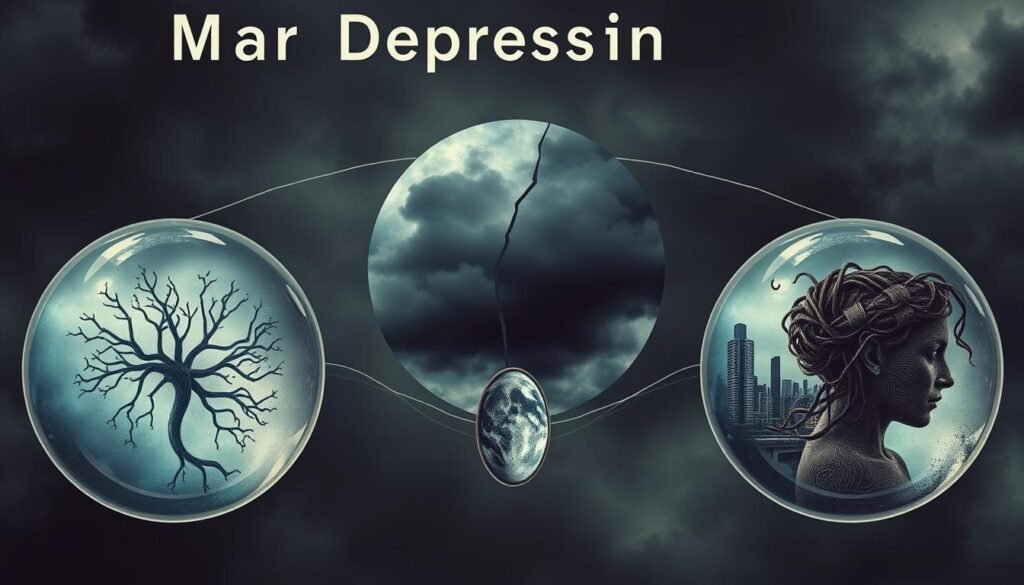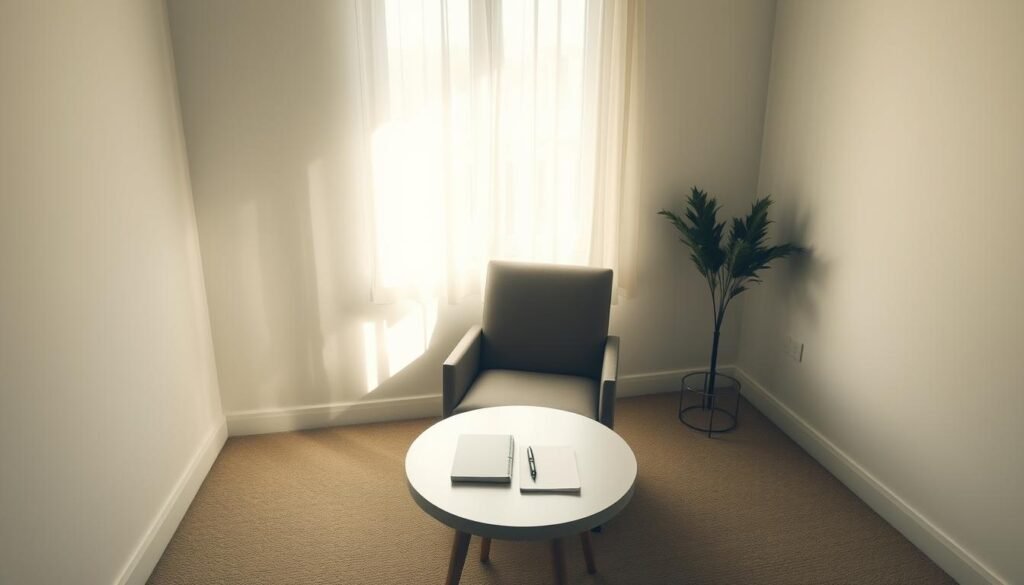About one in six people will face major depression at some point. It’s more than being very sad. Major depression or clinical depression messes with your daily life in big ways. It changes how you feel, think, and handle daily activities.
This condition causes long-lasting sadness and a lack of interest. It’s not a short-term problem. People with major depression feel down for two weeks or more. Sometimes, it feels like there’s no hope.
It’s hard for people with this disorder to sleep well or eat right. They often feel tired all the time. But, knowing the symptoms and reasons behind depression helps. It opens doors to finding ways to feel better. For a deeper look into depression, check out this resource.
Key Takeaways
- Major depression can drastically affect emotional, physical, and behavioral health.
- Symptoms last for at least two weeks for a proper diagnosis of major depression.
- Effective treatments include medications, therapy, and lifestyle changes.
- Understanding the multifaceted causes such as biological, social, and psychological factors is essential.
- Seeking help is crucial; individuals are encouraged to consult healthcare providers if experiencing depressive symptoms.
What is Major Depression?
Major Depression is a serious mental health issue. It changes how people feel, think, and do daily tasks. Over 20 million people in the U.S. have it, showing how common it is and why we need to understand it more. It makes people feel really sad or lose interest in things they liked. This can cause a lot of mental pain.
To be diagnosed with major depression, symptoms must be present almost every day for two weeks. This makes it different from other types, like persistent depressive disorder, which lasts for years, and postpartum depression, which starts after having a baby. Symptoms include changes in sleep, weight, feeling tired, feeling worthless, and trouble thinking clearly.
To diagnose major depression, a person must have five of nine specific symptoms for two weeks. These symptoms greatly affect a person’s social life, job, or other important areas. It’s important to tell it apart from other mental disorders, like schizophrenia, to find the right treatment.
Understanding major depression is key in getting the right help. It includes distinguishing anxious distress, melancholic features, and seasonal patterns. Spotting it early and getting help quickly is crucial. It helps reduce its bad effects and improves chances for recovery.
Symptoms of Major Depression
Knowing the symptoms of major depressive disorder matters a lot. These signs can show up in your emotions, body, and how you act. Spotting them early can help get the right help, making life better.
Emotional Symptoms
Emotional symptoms are clear signs of major depression. People often feel persistent sadness, hopelessness, and easily get irritated. Dealing with emotions becomes tough. They may quickly get frustrated or feel emotions that just won’t sit still.
Physical Symptoms
Depression also affects the body. It can make people lose or gain weight and mess with how much they sleep. Some find it hard to sleep, or might sleep too much, causing tiredness. These symptoms make the sadness of depression even heavier.
Behavioral Changes
Depression changes how people act. Things that used to make them happy don’t anymore. So, they might stay away from friends and lose the drive to do things. This can make them feel even sadder and alone. It’s key for loved ones to notice and help them get support. For more on understanding and treating depression, check out these clinical guidelines.

| Type of Symptom | Examples |
|---|---|
| Emotional | Persistent sadness, hopelessness, irritability, emotional dysregulation |
| Physical | Fatigue, sleep disturbances, weight gain or loss |
| Behavioral | Withdrawal from activities, decreased motivation, changes in social interactions |
Understanding Clinical Depression
Clinical depression is a serious mood disorder that affects many people in the U.S. About 6.7% of adults over 18 suffer from major depression. This kind disrupts their daily lives. Not just adults, but also teens and children can have depression. Often, it is missed in these younger groups.
Clinical depression is more intense than other types. The symptoms last over two weeks and are severe. People find it hard to focus, decide on things, or do everyday tasks. These issues can cause big problems at work and home.
More women than men get clinical depression. This is due to hormonal changes and stress. In men, it shows up as irritability and anger. This difference means men are often not diagnosed. Stigma around mental health stops many from getting the help they need.
It’s crucial to understand clinical depression to reduce stigma and find good treatments. Knowing the signs can lead to early help. This can prevent the worst effects of not treating the condition.
Causes of Major Depression
We look into why people get major depression by studying different factors. These include biological, social, environmental, and psychological aspects. Each plays a special role in affecting an individual’s experience with depression.
Biological Factors
Biological aspects are key in understanding who might get major depression. Having family members with depression means you’re more likely to have it too. Research shows genetics are behind about 40% of the differences in people’s risk. Also, hormonal changes from events like having a baby or going through menopause can lead to depression. Common health problems like heart disease, diabetes, and chronic pain are also linked to a higher risk of depression.
Social and Environmental Factors
Social and environmental factors include experiences that can lead to depression. Things like losing someone, getting divorced, losing a job, or money problems can start depressive feelings. Feeling lonely or isolated, especially in tough times, makes older adults more at risk. Studies also show that bad relationships, full of conflict, can increase depression chances.
Psychological Factors
Psychological factors deal with mental and emotional health. Low self-esteem, being too hard on oneself, and past trauma can make depression more likely. Bad experiences in childhood, like abuse or neglect, have effects that last into adulthood, raising depression risks. Also, people with problems with substance abuse have a strong link to depression, with nearly 30% suffering from both.

| Factor Type | Examples | Impact on Depression |
|---|---|---|
| Biological Factors | Genetics, hormonal changes, chronic illness | Increased vulnerability due to family history, hormonal shifts, and medical conditions. |
| Social and Environmental Factors | Stressful life events, loneliness, unhealthy relationships | Major life changes and isolation raise the risk of depression. |
| Psychological Factors | Low self-esteem, past trauma, substance misuse | Negative self-image and unresolved trauma contribute to the prevalence of depressive symptoms. |
Diagnosis of Major Depression
To diagnose major depression, experts start with a mental health evaluation. They look at the patient’s history and symptoms today. This step is key because around 8% of people over 12 in the U.S. are affected by major depression.
Doctors might do physical exams, lab tests, and check against the DSM-5. These efforts ensure other health issues aren’t causing the symptoms. For instance, regular medical tests can spot conditions that seem like depression.
For a clear diagnosis, a person must feel very sad or uninterested in life for two weeks. They also must have four or more specific signs. Since symptoms vary widely, it’s important to recognize differences between men and women.
Tools like the Patient Health Questionnaires (PHQs) and the Beck Depression Inventory (BDI) measure depression’s depth. The U.S. Preventive Services Task Force urges screenings for those over 18 and young people aged 12 to 18. Yet, under 5% of adults actually get screened, showing a need for better early detection.
Spotting major depression early can save lives, as the disorder raises suicide risks. Knowing how diagnosis works can fight stigma. This encourages open talks about mental health.

For more insights into depression myths and facts, check out this resource.
Treatment Options for Major Depression
Many options exist for treating major depression, depending on how severe it is. Knowing these options helps those seeking support. Psychotherapy and medications are vital in reducing depressive symptoms. Techniques and approaches are available to ease depression’s effects on life.
Psychotherapy Approaches
Psychotherapy is key in fighting depression. It uses methods like cognitive-behavioral therapy (CBT) and interpersonal therapy (IPT). CBT changes negative thinking, and IPT focuses on better relationships and social skills. These methods help people cope better and handle emotions in healthy ways.
- Cognitive-Behavioral Therapy (CBT)
- Interpersonal Therapy (IPT)
- Problem-Solving Therapy
- Psychodynamic Psychotherapy
- Family/Couples Therapy
Medications
Antidepressants are crucial for treating depression. They include SSRIs and SNRIs. It usually takes about four to eight weeks for them to work fully. In harder cases, a mix of drugs and therapy works well for many.
- Common Antidepressants: SSRIs, SNRIs
- Older Medications: Tricyclic Antidepressants, Monoamine Oxidase Inhibitors
- Rapid Relief Options: Ketamine, Esketamine
- Brain Stimulation Techniques: rTMS, ECT, Deep Brain Stimulation
If depression doesn’t improve, trying different treatments might be needed. Pharmacogenetic testing helps find the right medication, increasing success chances. It’s also important to check if your insurance covers these treatments.
How to Cope with Major Depression
Coping with major depression means making smart choices in your life. These choices can greatly help with your well-being. By adding good coping skills into your daily activities, you can better handle your depression. This isn’t just for now; it’s for your future healing too.
Lifestyle Changes
Making exercise a habit brings great benefits. Studies show that 30 minutes of physical activity a day is really helpful. It can reduce depression symptoms as well as some medications. Getting sunlight for 15 minutes a day also increases serotonin, which can lift your mood. Starting these habits can boost your feelings of success and improve your mood.
Eating right is key to fighting depression. A diet full of important nutrients can keep your brain healthy and mood stable. Drinking plenty of water and skipping processed foods are good moves. These simple lifestyle shifts can truly help with coping.
Staying connected with people is crucial to avoid feeling alone. Regular chats with loved ones can strengthen your mental health. Support groups are also valuable. They let you share stories and find help. You’ll gain comfort and learn from others who understand what you’re dealing with.
Mindfulness like meditation and expressive writing can help manage emotions. Writing lets you express what you’re feeling privately. It’s a safe way to handle sadness and stress. Plus, it’s a good strategy to understand your mood swings.
It’s wise to avoid big decisions when you’re feeling down. Wait until your mind is clearer. This can save you from added stress.
| Copings Strategies | Benefits |
|---|---|
| Regular Exercise | Reduces symptoms by 40%, comparable to medications |
| Mindfulness Practices | Improves emotional regulation and stress management |
| Social Support Groups | Offers connection, understanding, and shared resources |
| Expressive Writing | Facilitates emotional expression and mood tracking |
| Adequate Sunlight Exposure | Boosts serotonin levels and enhances mood |
In summary, adopting certain lifestyle changes is key for dealing with major depression. These strategies improve your day-to-day life and overall mental health. Stick with these practices for a strong impact on your journey to wellness. For more tips on handling depression, check out coping with unexpected episodes and learning about different types of depression.
Seeking Help for Major Depression
If you’re feeling symptoms of major depression, it’s important to seek help. Taking this first step can really change your mental health path. When you talk to healthcare pros or mental health experts, you get a full picture of what you’re going through. Women get diagnosed more often than men. Men tend to wait longer to get help because they might not want to talk about their feelings.
Being part of support groups or therapy helps people connect. These settings can make you feel less alone if you have major depression. People from all walks of life, including the LGBTQI+ community, face higher depression rates. It shows why we need mental health support that fits everyone’s unique needs.
Dealing with major depression means often feeling really down, hopeless, and having a hard time with everyday stuff. It’s really important to help those we care about find support. Talking openly about mental health can lower stigma and push people to get professional treatment.
There are a lot of resources out there for support. Websites like Brightside Health and Talkspace offer therapy online. If someone needs help right now, they can reach out to the Suicide and Crisis Lifeline (988) or the Crisis Text Line (send “HOME” to 741741). The Mayo Clinic also stresses knowing about these options for mental health support.
| Support Resources | Service Type | Contact Information |
|---|---|---|
| National Alliance on Mental Illness | Support Groups | Call 1-800-950-NAMI (6264) |
| Samaritans 24-Hour Crisis Helpline | Crisis Support | Call 1-877-870-4673 |
| Crisis Text Line | Text Support | Text “HOME” to 741741 |
| Brightside Health | Online Therapy | Visit brightside.com |
Looking for help when you have major depression shows courage and is key to getting better. Trying out options like online therapy, joining support groups, and seeing professionals can lead to a happier life.
Conclusion
Major depression deeply affects people and their lives. About 5% to 10% of patients in the U.S. deal with this hard condition. It causes big problems for both people and society. Understanding depression is key to fighting the stigma around mental health.
We must support those who suffer, so they feel okay asking for help. This way, they won’t have to deal with it alone.
Treatments like therapy, medication, and lifestyle changes can help manage depression. Often, people first go to a general doctor. But it’s crucial to also work with mental health experts.
Treatment plans that fit the individual can really help them get better. They improve life and bring hope.
Building emotional strength day by day is also important. Practices like mindfulness and gratitude journaling help. So does having a regular schedule.
Doing these things every day, along with getting professional help, can change lives for the better. For more tips on handling depression, check out effective coping strategies for managing depression.